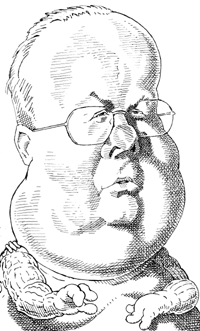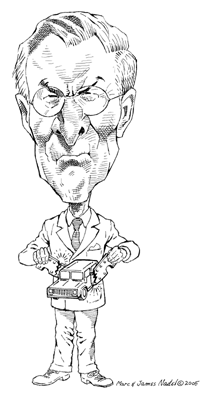Campaign 2006: The Initially Amusing, Unexpectedly Queasy Interview With Mark Shepard
Republican Mark Shepard is a two-term State Senator from Bennington, and when he officially announced his candidacy in early January, alarm bells went off in Republican strategy rooms across the state.
Martha Rainville — fresh from a successful stint as Adjutant-General of the Vermont Guard — looked to be the GOP’s only realistic chance of capturing Bernie’s Congressional seat, and the party’s plan called for keeping Rainville’s campaign on the down-low for at least another few months, when she would emerge as a fresh, moderate voice.
 As Donald Rumsfeld would say, the Vermont GOP battle plan didn’t survive contact with the enemy — in this case, Shepard himself. His forthright entrance into the race made Rainville seem suddenly either indecisive or deliberately coy; his more outspoken conservatism challenged the moderate new face of the party. [Photo Courtesy of Bennington Banner]
As Donald Rumsfeld would say, the Vermont GOP battle plan didn’t survive contact with the enemy — in this case, Shepard himself. His forthright entrance into the race made Rainville seem suddenly either indecisive or deliberately coy; his more outspoken conservatism challenged the moderate new face of the party. [Photo Courtesy of Bennington Banner]
But then something unaccountable happened: the mainstream media more or less pretended that Shepard didn’t exist.
When Welch issued a statement — coming out against torture by US personnel, say — the media would quickly contact Rainville’s camp for reaction. Rainville’s camp would respond that Martha Rainville was not a candidate, and hence had nothing to say. This non-statement would then conclude nearly every article on the race.
This dynamic repeated itself endlessly, for months. Almost never was it acknowledged that there was a Republican officially in the race, a State Senator, who had things to say. Lots of things.
And so I decided to take the matter in hand myself.
Shepard and I met at Libby’s Blue Line Diner, an old-school silver model perched up on a little corporate switchback in Winooski. And I came to the breakfast with a pretty light spirit: the State Republican Party had recently snubbed Shepard by directing the national committees to funnel money only to Rainville — an unprecedented move — and I thought he and I could at least agree on tweaking the Republican leadership.
And we did.
But something else happened that took the conversation in a suddenly queasy direction: Shepard began to lay out views on gay rights that I found increasingly difficult to process over an English muffin and soft-boiled eggs.
And like it or not, I found myself pulled into the sort of gut-wrenching conversation on social issues that most of us in America have tried assiduously to avoid since our country became so sharply polarized.
If anyone out there is still confused about the difference between a journalist and a political blogger, the difference is this: at a certain point, I could no longer let the tape recorder do the work. I had to put down my bacon, and pick up my beliefs, such as they are.
Which makes for a bad breakfast, unfortunately.
* * *
VDB: So, first things first, what would you say — if you had to be 100% honest — is your favorite political blog?
Shepard: Well, I don’t spend much time looking at political blogs, to be honest with you.
VDB: Would you say Vermont Daily Briefing?
Shepard: [Getting the joke] Yeah, I guess it would have to be. [Laughing] Really, I haven’t spent a lot of time looking around at the blogs.
VDB: Yeah. Bloggers are kind of in a world of their own. A little echo chamber. There’s always this illusion that they’re being read, but clearly no.
Shepard: No, no, I’ve gone to yours, I’ve gone to some others. But my life is quite busy and not a lot of time to be following through on all these things.
VDB: Now, you’re a technology person. Are you also an Internet guy?
Shepard: I did my own website when I ran my State Senate race. It looked fairly techy, so we’re having somebody with some more marketing experience do this one.
VDB: [Fiddling with tape recorder] Maybe if you could lean forward a bit. Your voice is a little soft, and I’m not sure we’re getting everything.
Shepard: Sure, yeah.
VDB: So let’s go right to the entrée: last week the Vermont Republican Party did something unprecedented. They officially selected a candidate before the primary and directed their national counterparts to funnel money only to Martha Rainville. Jim Barnett said, “If we stayed neutral in all of this until September, it would ensure defeat, and I’m not willing to accept that.”
For your part, on WCAX, you called the move, “One of those things that’s not right,” which is a pretty polite way of putting it. So my question is, If the move wasn’t right, what was it? In a more direct sense.
Shepard: Well, what I mean by that wasn’t necessarily that it was wrong and harmful for me. I don’t particularly think it is going to be. I think Vermonters are independent, and I think they made — I think they made a mistake. It wasn’t right for the voter.
You know, what is the race about, is it about inside politics? Whether it be Republican or Democratic politics — we’ve seen similar maneuvers in both parties. The way was cleared by Peter Welch; that wasn’t an accident. That happened with some manuevering. It didn’t wind up being public the way it did with the Republican party.
But those maneuverings were going on long before. You know, David Zuckerman being pretty heavily pushed aside. That’s a similar type of move.
VDB: Well, he is in a different party, the Progressive Party. But I see your point.
Shepard: Yes, but there were some workings going on between the two parties. That’s pretty clear. But you know, I don’t think that serves the voters. I think if David Zuckerman was there he could energize a certain sort of voter — Peter Welch can’t energize those people to the same level. And the same is true in Republican circles. They are energized because of what I’ve done in the Senate, or whatever, and others that Martha Rainville probably energizes.
VDB: Now, would you say that this energy has to do with the fact that David Zuckerman sits a little further to the left, in the more activist wing, a bit more ideologically oriented maybe? And would you say the same about yourself, that you energize your voters because you’re getting to the more conservative activists?
Shepard: Well, a little bit of that, but it goes beyond that. I’ve done some fairly significant things even as a Senator. I have a record — so I have a record of holding down on taxes, working to keep the budgets down, which is absolutely essential if we’re going to be a state where people can afford to live.
So there’s a number of things. Martha Rainville doesn’t have a record. So she can’t really energize any group like that. She’s a nice person. Maybe some people will come to politics because of that, what she brings to it. We don’t really know yet. She hasn’t really said a lot.
VDB: It’s a good point. Rainville is newly a Republican, if she is a Republican in your sense of the term. That’s one of the reasons why I find the [Republican] Committee move so noteworthy. It’s not for a longtime Republican party member, and it’s a move that disadvantaged someone — yourself — who had already worked with and through the party system. You know, you got into office at the State Senate level, which is a powerful position in the state, and to say, we’re going to just bypass you and go with someone who just declared themselves a Republican seems [searches for suitably diplomatic term] odd to me.
Shepard: Yeah, I think it certainly is. I don’t think the track record of our Republicans electing Republicans is really all that great, and I think they made a mistake. But we’ll see. At the end of the day it’s the voters. And limiting the choice for voters isn’t good. I think I’ve got a very good chance of going all the way. I certainly have to get known better, no question about that. But I have a record that I’m very proud to run on.
VDB: Now, just to go back to what you said about the Republican Party not having such a good track record — [Republican Chair] Jim Barnett’s fault?
Shepard: [Allows himself a small smile] You know, I think the buck kind of does have to stop there, to some degree. The Legislature — both elections that I’ve won, we’ve lost Republican legislators and Senators. Is there a strategy there? Well, if there is one, it isn’t a good one. And if there isn’t one, then that’s not good either.
I don’t think you can just blame things on the political climate, and this and that, because I won in a liberal county, both times, with Democratic votes. So I think you can win in Vermont as a Republican. Very much so.
VDB: Okay. On Rainville’s candidacy — and I want to stay there for just a minute more before we get into the affirmative reasons for voting for you — there have been early questions about fund-raising, having nothing to do with this recent [state Republican] party decision, but having to do with the Delay/Blunt PAC money. If I’m right, you called that money “tainted” in the Free Press article; you said it was disappointing that she didn’t return the tainted money.
Shepard: Well, she needs to make her choices about what she wants to do, and let the voters make their choice. I’m not going to criticize what she does, she has every right to make that choice.
VDB: Right. But at the time you called it tainted. Is that —
Shepard: Look, if you want to go to Washington to make a change, you should position yourself to do that. That’s certainly a little more difficult if that’s who’s getting you elected. But by the same token, Peter Welch has certainly taken money from Washington, so I think you have the same thing.
You know, to change the culture down there, I don’t think it’s a partisan issue, I really don’t. The corruption comes in all forms, from people who want power. So I don’t think just sending a different party down there is necessarily going to do it. It’s who you send, how have they conducted themselves, and who are they beholden to.
VDB: The one thing that strikes me about that particular set of donations, the Rainville Blunt/Delay donations — and you’re right, PAC money is going to be a factor in both sides of the race — but the Delay fundraising operation was so blatantly the amassing of a political slush fund, and now various revelations have shown that the central ways the money was raised and channelled, almost all of it was unethical and much of it was illegal. And so with Delay resigned from Congress, it seems like a no-brainer to say, we need to step away from it.
But let’s put that aside for a second. Another set of questions involves Rainville’s promise not to accept money from Big Tobacco — yet a lot of this money comes, through Blunt, from tobacco interests. At this point are you swearing off PAC money, any or all of it?
Shepard: No. No.
VDB: What are your rules, then?
Shepard: I want to know that they’re — you know, I’m not heavily going after it, but if there was some group that was really standing up for something principled and important and really good for our country and our state, I would work with them.
VDB: Have you gotten money of that sort so far?
Shepard: No. But I certainly know groups that are interested in me, that support limited government, low taxation. Those groups are very interested in this race.
VDB: Right. That gets me to my next question, and that is trying to figure out what kind of conservative — if conservative is even the right word — you actually are. Because the media has been quick to say, I think, that Martha Rainville is a fresh-faced moderate, and therefore Mark Shepard must be a hard-charging, right-wing ideologue.
If you go on the Internet — and I know this isn’t your favorite thing to do — you’re described different ways. How would you define yourself as a conservative, and what does conservative mean in a state like Vermont?
Shepard: You know, I don’t tend to use labels a whole lot. I tend to discuss the issues, and my focus is, Okay, what sort of policy will make what better in Vermont. Better in America. I don’t necessarily go down thinking about whether something’s conservative or liberal. I haven’t seen a lot of reports talking about Peter Welch as the liberal.
So let’s just talk about where we are. I don’t think labels are real productive. So yeah: limited government, individual liberty, personal responsibility — that would be where I’m at.
VDB: That matches more or less the way I would describe Libertarian positions. Do you see a kinship there?
Shepard: Oh, absolutely. I’m not where the Libertarians are on everything, but I certainly lean that way on many things. You know, government — and I think this is the way the Founders thought about things — you have two ends of the spectrum: tyranny and anarchy. You need something in between those two, and that’s what we’re shooting for, but it’s a moving target. Things change, and you move a little bit. You get into certain situation, in a war, certain things happen, when the war’s over, different things happen. That’s happened in all the wars we’ve ever had, the policies have just moved along.
But I think that in general, we’re trying to find some balance. Do you need regulations on business? Yeah, we need laws, for the environment, we need them very clearly. But how are those set up? Are they cumbersome laws that make people go through hoops that don’t really accomplish a lot? Same with tax policy. Simplifying it could be a huge asset, especially for small business. Both of those things really hurt the small business a lot.
VDB: That makes some sense to me. But on the social piece, conservatives often tend to — in my mind — get involved in a bit of hypocrisy because they want to limit personal freedom, and regulate social behavior. So nationally you’ve got movements to regulate all sorts of social behavior —
Shepard: But is that any different than trying to regulate business behavior. Again, you’re trying to find a balance, and you can’t just have everyone do what they want because it might just be that what they do impacts somebody else. That’s when it matters: when it impacts somebody else.
VDB: I said on some of these websites you’re described in different ways. The one that struck me the most is from an extremely popular site called Daily Kos, and on it somebody posting as “Kestrel” — which if I remember right is some sort of bird of prey — this person said, and I’ll quote, “Mark Shepard is an anti-gay, fundamentalist Christian. When Shepard came out of the gate with that asinine Defense of Marriage Initiative [A reference to a controversial amendment Shepard sponsored during the Civil Union debates in the Legislature] I blasted him on the air” — which leads me to believe that this person has a radio station of some sort —
Shepard: Could be.
VDB: [Continues quote] “The following Monday, Shepard shows up at the radio station. I about had a heart-attack.”
Shepard: Oh, I know who this is.
VDB: [Still quoting from Daily Kos comment string] “Shepard proceeded to tell me that his amendment on the Defense of Marriage Initiative would in no way affect the Civil Union law, but read the initiative if you can find it, read Baker v. State of Vermont, and note the use of language.”
And Kestrel goes on to say that he thinks you lied to him about what the Defense of Marriage Act was meant to do.
So let’s just take that first part, the “anti-gay fundamentalist Christian” part. How do you respond to that characterization of who you are? And then, when you like, how do you respond to the characterization of what you were attempting with your work on the Defense of Marriage Initiative?
Shepard: Well, I put in an amendment that would define what marriage is. It did not undo civil unions. I think that’s where I felt it should be. I don’t think we should have gay marriage.
VDB: I would go back to your earlier statements, about liberty. It seems to me that a Libertarian would say, Who I marry or what I do in my house, in my domicile, is my own business and government regulation at that point is not just unnecessary, it’s threatening.
You talked about the moving target — and you said you would only regulate it if impacted other people. So why is there a need to regulate in that area?
Shepard: Making gay marriage is regulating it. Not having gay marriage is not regulating.
VDB: But isn’t it allowing something that everybody else has? If you’re heterosexual, you can marry — that’s an option, it’s a liberty. So by allowing something, isn’t that an affirmative statement rather than regulating that someone can’t do something?
Shepard: What you’ve done when you create civil marriage is that you’re regulating that situation.
VDB: But you’re not forcing someone to marry.
Shepard: No, you’re not. But you are creating a system by which it’s regulated. I don’t think there’s a reason to do that. Now if somebody does it in their own house, whatever they want to do, so be it — it’s been that way. I’ve never made any thing about it.
But as far as the government having some purpose . . . the basis of marriage shifts. It’s shifted from having some purpose around reproduction and raising children that you biologically produce — and of course there are exceptions, but laws should be made in the norm, not in the exceptions. Except in the case of civil rights.
So that’s what marriage is fundamentally about. And we have a huge breakdown there, you’re talking about huge costs. So I think it’s important to have marriage be about that. If you move it to being about how much you love, well, government has no way of detecting how much somebody loves somebody, number one. Number two, where do you draw the line? How can you make any defense against any type of group marriage, if you go that way? Polygamy, or whatever else?
If you use the logic that it’s consenting adults who love and care for each other, you can make no distinction between those things. And you open up the gates for anything. Is that where we want to go?
VDB: Well, that was Rick Santorum’s infamous argument: if you allow gay marriage the next step is going to be bestiality. And I think that’s just illogical.
In effect what’s gone on is that we have legislation against a certain population’s ability to do something that the rest of the population is allowed to do. So it seems to me that what civil unions did was to remove most of that barrier to action.
Shepard: Well, we also have certain laws set up because we see a benefit to society. And other people are excluded. You know, the WIC program [Women, Infants, Children] is for women and children. Why? Well, there’s a reason for that.
VDB: I would say, if you’ve got a guy who’s a low-income single parent, and he’s got kids and can’t feed them, we should go ahead and help him too.
Shepard: But it isn’t for the man, because he’s not nursing the infant. But anyway, that happens all the time, you have things where a certain group is picked out for the benefit. You know, when you pass a law, you have to ask, Is the societal benefit worth passing a law? And what are the other things that it does open up.
In this case, give me the defense for keeping it illegal to have polygamy. [Waits for answer] Why two? You’re excluding people who might want to have a polygamous marriage, or a group marriage? [Waits again] How can you rationally do that at this point?
VDB: I don’t have a problem in my own mind limiting marriage to two people.
Shepard: But why? What’s your rationale?
VDB: I guess I’m thinking about each person making a lifelong commitment to another person, an exclusive commitment.
Shepard: Suppose three people do that? Where’s the rationale?
VDB: So the way you see it there’s no difference between polygamy and same-sex marriage?
Shepard: This is what you’ve reframed marriage to be, people that are saying they want to be committed together, and that they love each other. That’s the basis.
VDB: But what’s the matter with that?
Shepard: I’m not saying that. But we need to decide as a society, Do we want to go there? What my amendment did is say that it wouldn’t be legislated in the court. If we put benefits out there like that, for any arrangement, it would be done through the political process, not through the judiciary. Who should determine that? A few people sitting behind the bench, or the public? That’s all.
VDB: The history of civil rights in America is that the courts have led —
Shepard: This is not a civil rights issue. The courts have said that. The Supreme Court did. I think it was a case in Georgia, many years ago. In order to be civil rights, there’s four criteria: one is you have to be economically deprived; politically deprived; educationally deprived — and all three of those, this particular group [homosexuals] is well ahead of the norm. Okay?
VDB: Keep going.
Shepard: The last criteria was something — you had to have a characteristic that was physically unchangeable. Well, you have thousands of people who were gay that are no longer, by their own testimony. What do you do with that? So clearly the issue doesn’t meet any of the four criteria. It is not a civil rights issue.
VDB: Well, obviously you have very strong opinions on the issue —
Shepard: I just use logic on it, that’s all. Nothing beyond that. I don’t have to go to any religious argument. Make the case using logic. I’m an engineer. It’s the way I think.
VDB: I haven’t really given you a chance to lay out your platform yet, what you’re going to run on. And I know low taxation is part of it.
Shepard: I had an email just the other day — we got some federal money coming in. The first discussion is always we gotta match these funds to get them, what taxes are we going to raise to do that. I don’t believe we can raise taxes in Vermont without further hurting ourselves. I think we gotta go the other way.
I got an email the other day — I have to check the source on it — but it said that per capita we’re the highest taxed state in the nation. That’s one of the reasons businesses are leaving here and others are not growing here. And fundamentally, you can’t keep doing that without creating future problems.
I came back here after getting my undergraduate at University of Florida, electrical engineering, and looked for a job. There wasn’t a lot here in my field. That’s a field where there should be jobs. It’s where our future is. Everybody benefits from that.
VDB: Now, the Bennington Microtechnology Center — is that part of what you’re talking about?
Shepard: This goes to the core of my campaign. All of us have different folks that we’ve spent our lives with, different connections. My connections are in the technology sector. And that’s why the microtech center is in Bennington. If I had been a trial lawyer [as is Peter Welch], it would have been something different, okay? That’s a significant difference.
The Microtech Center is a first-in-the-nation center that deals with the packaging and assembly of microdevices, devices on the size of a human hair. An amazing variety of applications from medical to sensors and actuators — you could put something in that would pump medicine into somebody a little at a time. You could focus chemo right on the tumor, right inside.
But all of those devices need to be packaged, and they need to be assembled. That’s the part that nobody else is working on in this nation. So we did the first. Germany and Switzerland, I believe, have something similar.
VDB: One more question. You have a Master’s Degree in automation and robotics, I think I have that right. And you’ve gotten a good look lately at Bill Noyes, Rainville’s communications director. Do you suspect somewhere, down deep, that Noyes might be a simulacrum of some sort — a robotic construct of some sort?
Shepard: [Smiling] No comment.
VDB: Because they keep saying these odd phrases over and over again, you know, like “no fingerpointing, no fingerpointing.” I was just wondering.
Shepard: If that’s the way they want to run their campaign, have at it. I want to be accessible to people. You and I, you know, we had an honest, frank discussion.
VDB: It was pretty frank.
Shepard: That’s the way it should be. [Laughs, and reaches for the check] I don’t hold anything against anybody, you know. It’s more enjoyable when you just roll with the punches.
[After we shook hands in the parking lot and headed to our cars, I realized what had been at the edge of my consciousness during breakfast: Mark Shepard’s name is about as close to the name “Matthew Shepard” as you can get without actually being named Matthew Shepard.
Earlier in the week I’d been talking with a friend in a same-sex relationship who was about to move from Vermont to Wyoming, to a town near where Matthew Shepard was murdered. My friend was excited, and he was worried — for himself, for his partner, for their relationship.
He was worried, in short, about being killed.
Maybe that was why I’d felt especially troubled during and after my talk with a man who wants to be Vermont’s next Congressman, the replacement for Bernie Sanders. Because for all of his pleasant demeanor and entrepreneurial savvy, Shepard strikes me as Vermont’s version of Rick Santorum: ambitious, well-spoken, and more than just a little disturbing when you take the time to really listen to what he has to say.]
 “And so, a Prediction: by May Day, Bush will finally give one of the Heavy Hitters the heave-ho. That would be the Big Five — Rumsfeld, Cheney, Chertoff, McClellan, or Rove.
“And so, a Prediction: by May Day, Bush will finally give one of the Heavy Hitters the heave-ho. That would be the Big Five — Rumsfeld, Cheney, Chertoff, McClellan, or Rove. “President Bush and U.S. policy-makers are receiving more intelligence from open sources such as Internet blogs and foreign newspapers than they previously did, senior intelligence officials said.”
“President Bush and U.S. policy-makers are receiving more intelligence from open sources such as Internet blogs and foreign newspapers than they previously did, senior intelligence officials said.”

 As Donald Rumsfeld would say, the Vermont GOP battle plan didn’t survive contact with the enemy — in this case, Shepard himself. His forthright entrance into the race made Rainville seem suddenly either indecisive or deliberately coy; his more outspoken conservatism challenged the moderate new face of the party. [Photo Courtesy of Bennington Banner]
As Donald Rumsfeld would say, the Vermont GOP battle plan didn’t survive contact with the enemy — in this case, Shepard himself. His forthright entrance into the race made Rainville seem suddenly either indecisive or deliberately coy; his more outspoken conservatism challenged the moderate new face of the party. [Photo Courtesy of Bennington Banner]